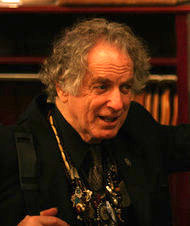As a sideman or leader, Amram has worked with Aaron Copland, Thelonious Monk, Dizzy Gillespie, Charles Mingus, Jack Kerouac, Sonny Rollins, Lionel Hampton, Stan Getz, George Barrow, Jerry Dodgion, Paquito D'Rivera, Pepper Adams, Arturo Sandoval, Oscar Pettiford, Allen Ginsberg, Mary Lou Williams, Kenny Dorham, Ray Barretto, Wynton Marsalis, and others. [2] [4] [3] [5] [6] [7] He has also worked with a wide range of folk, pop, and country figures, such as Bob Dylan, the Roche sisters, Pete Seeger, Odetta, Willie Nelson, Oscar Brand, Judy Collins, Peter Yarrow, Tom Paxton, Phil Ochs, Josh White, Patti Smith, Arlo Guthrie, and others. [2] [7] [8]
In 1956, producer Joseph Papp hired Amram to compose scores for the New York Shakespeare Festival. Over the years, Amram composed scores for 25 of Papp's productions, including a number of Shakespeare in the Park presentations. [1] In 1961, he served as guest composer-in-residence for the Marlboro Music Festival in Vermont. [5]
In 1957, Amram, along with Jack Kerouac and poets Howard Hart and Philip Lamantia, staged one of the first poetry readings with jazz at the Brata Art Gallery on East 10th Street, in New York. [9] [10] In an interview with American Legends website, Amram recalled: "Jack and Philip loved each other. That’s why we did that first poetry reading [in 1957]. Just before he died, Philip reminded me of a conversation he had with Jack before On the Road came out...Philip had said to Jack, 'I was a prodigy and received a certain notoriety as a teenager. I couldn’t stand it.' Philip was referring to the period in the 1940s when he was taken up by Charles Henri Ford and the surrealists in New York. He told Jack: 'The whole scene was too weird. If On the Road does well, be prepared to look out.' And Jack said: 'Don’t worry, man. I can handle it.'" [11]
In 1966 Leonard Bernstein chose Amram as the New York Philharmonic's first composer-in-residence. [1] [3] He has performed as conductor and/or soloist with the Brooklyn Philharmonic Orchestra, Toronto Symphony Orchestra, Milwaukee Symphony Orchestra, Indianapolis Symphony Orchestra, Montreal Symphony Orchestra, Grant Park Symphony Orchestra, and for the National Jewish Arts Festival. [5] He has conducted at New York's Carnegie Hall and at Avery Fisher Hall, among other prestigious venues. [12]
The United States Information Agency sponsored a number of Amram's international musical tours, including visits to Brazil (1969); Kenya (1975); Cuba (1977); and the Middle East (1978). [4]
Amram's orchestral works include Symphonic Variations on a Song by Woody Guthrie , [13] (commissioned by the Woody Guthrie Foundation and premiered in 2007) and Three Songs: A Concerto for Piano and Orchestra (written for and premiered by pianist Jon Nakamatsu in 2009). [14] He conducted a 15-piece orchestra for Betty Carter's 1982 album Whatever Happened to Love?. [15]
Amram is a strong advocate for music education. For over a quarter-century he served as music director for youth and family concert programs for the Brooklyn Philharmonic. Amram has said: "It is tremendously important for professional people to work with the young. That is the way a true music culture is created—not through merchandising, but through love." [1]
